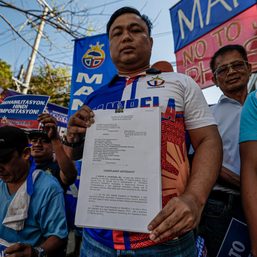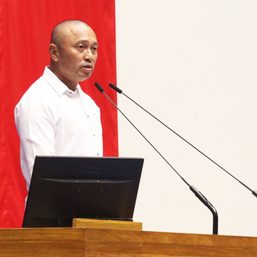SUMMARY
This is AI generated summarization, which may have errors. For context, always refer to the full article.
![[PODCAST] Law of Duterte Land: Deep dive into anti-terror law IRR](https://www.rappler.com/tachyon/2020/10/Law-of-DuterteLand-1280-pt-2-1.jpg)
The water cannot rise above the source. That is a recurring phrase from lawyers critical of the anti-terror law after the publication of its Implementing Rules and Regulations (IRR).
It simply means that nothing in the IRR can fix the law that, for them, is problematic to begin with.
The IRR has new features – it now allows a process for people designated as terrorists to delist themselves. It now also requires law enforcers to submit a sworn affidavit before they can be authorized by the anti-terror council to detain a suspect for 24 days.
But critics have also pointed out new features that make the law even more problematic. For example, the IRR now requires that the names of the designated terrorist be published on the internet. That is legalized red-tagging, according to them.
The IRR also introduced new standards – reasonable ground of suspicion for designating terrorists and reasonable probability of success – to arrest and prosecute a suspect for the crime of inciting to terrorism.
In this episode, we have Department of Justice (DOJ) Undersecretary Adrian Sugay to discuss in detail the anti-terror law, the IRR, and what it can mean in actual situations.
Listen to past episodes:
- Episode 1 Part 1: Supreme Court’s most controversial decisions
- Episode 1 Part 2: Department of Justice’s evolving definition of warrantless arrests
- Episode 2: The rule of law in the time of the coronavirus
- Episode 3: Pandemic and the great wall of free speech
- Episode 4: Will petition to disclose Duterte health work?
- Episode 5: Legal difficulties of a prisoner mass release
- Episode 6: Breaking down the ABS-CBN franchise legal and political issues
- Episode 7: ABS-CBN and the 3 tangled branches of government
- Episode 8: Are extraordinary writs still effective in the time of Duterte?
- Episode 9: Dissecting anti-terror bill and threats to freedoms
- Episode 10: The problems with the Cybercrime Law
- Episode 11: Can we trust the gov’t panel probing drug war deaths?
- Episode 12: Why press freedom is legally protected
- Episode 13: What is People’s Initiative and will it work for ABS-CBN?
- Episode 14: The new push for death penalty
- Episode 15: A State of terror
- Episode 16: GCTA’s thorn – Do bad men deserve good things?
- Episode 17: Policies beyond body count of Duterte’s drug war
- Episode 18: Can we really bring Xi Jinping to the ICC?
- Episode 19: Philippine courts and the death of baby River
If you have tips and suggestions for episodes, email the host at lian.buan@rappler.com. – Rappler.com
Add a comment
How does this make you feel?






![[PODCAST] Law of Duterte Land: Is Marcos Jr. liable for P203 billion estate tax?](https://www.rappler.com/tachyon/2022/04/Law-of-DuterteLand-with-ls.jpg?resize=257%2C257&crop_strategy=attention)
![[PODCAST] Law of Duterte Land: Explaining Marcos’ P203-B estate tax debt](https://www.rappler.com/tachyon/2022/03/Law-of-DuterteLand-tcard-LS.jpg?resize=257%2C257&crop=283px%2C0px%2C720px%2C720px)
![[PODCAST] Law of Duterte Land: Scrap Malampaya deal with Dennis Uy – IBP](https://www.rappler.com/tachyon/2021/11/Law-of-DuterteLand-PROMO-ls-1.jpg?resize=257%2C257&crop_strategy=attention)

There are no comments yet. Add your comment to start the conversation.